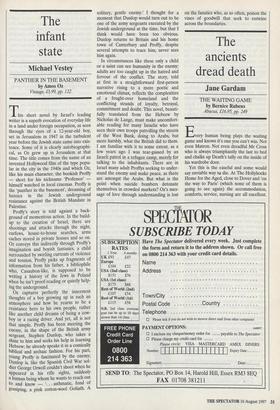The infant state
Michael Vestey
PANTHER IN THE BASEMENT by Amos Oz Vintage, £5.99, pp. 122 This short novel by Israel's leading writer is a superb evocation of everyday life in a land under foreign occupation, as seen through the eyes of a 12-year-old boy, set in Jerusalem in 1947 in the turbulent year before the Jewish state came into exis- tence. Some of it is clearly autobiographi- cal, as Oz grew up in Jerusalem at that time. The title comes from the name of an invented Hollywood film of the type popu- lar in the city in the 1940s and which Oz, like his main character, the bookish Proffy — short for his nickname 'Professor' himself watched in local cinemas. Proffy is the 'panther in the basement', dreaming of heroics in the Jewish underground resistance against the British Mandate in Palestine.
Proffy's story is told against a back- ground of momentous action. In the build- up to the creation of Israel, there are shootings and attacks through the night, curfews, house-to-house searches, arms caches stored in private houses and so on. Oz conveys this indirectly through Proffy's imagination and boyish fantasies, a child surrounded by swirling currents of violence and tension. Proffy picks up fragments of information from his father, a bibliophile who, Casaubon-like, is supposed to be writing a history of the Jews in Poland when he isn't proof-reading or quietly help- ing the underground. Oz captures perfectly the innermost thoughts of a boy growing up in such an atmosphere and how he yearns to be a resistance hero to his own people, rather like another child dreams of being a cow- boy or a racing driver. And yet, all is not that simple. Proffy has been meeting the enemy, in the shape of the British army sergeant, Stephen Dunlop, who takes a shine to him and seeks his help in learning Hebrew; he already speaks it in a comically biblical and archaic fashion. For his part, young Proffy is fascinated by the enemy; Dunlop is, like the Spanish Civil War sol- dier George Orwell couldn't shoot when he appeared in his rifle sights, suddenly a human being whom he wants to reach out to and know — . . . asthmatic, fond of gossiping, a pink cotton-wool Goliath. A solitary, gentle enemy.' I thought for a moment that Dunlop would turn out to be one of the army sergeants executed by the Jewish underground at the time, but that I think would have been too obvious. Dunlop returns to Britain and his home town of Canterbury and Proffy, despite several attempts to trace him, never sees him again.
In circumstances like these only a child or a saint can see humanity in the enemy; adults are too caught up in the hatred and fervour of the conflict. The story, told at first in a straightforward first-person narrative rising to a more poetic and emotional climax, reflects the complexities of a fought-over homeland and the conflicting strands of loyalty, betrayal, commitment and doubt. This novel, beauti- fully translated from the Hebrew by Nicholas de Lange, must make uncomfort- able reading for many Israelis who have seen their own troops patrolling the streets of the West Bank, doing to Arabs, but more harshly, what the British did to them. I am familiar with it to some extent, as a few years ago I was tear-gassed by an Israeli patrol in a refugee camp, merely for talking to the inhabitants. There are in Israel many adult Proffys seeking to under- stand the enemy and make peace, as there are amongst the Arabs. But what is the point when suicide bombers detonate themselves in crowded markets? Oz's mes- sage of love through understanding is lost on the fanatics who, as so often, poison the vines of goodwill that seek to entwine across the boundaries.


























































 Previous page
Previous page